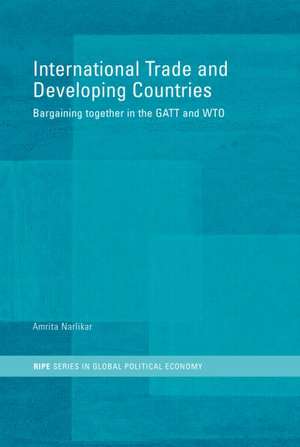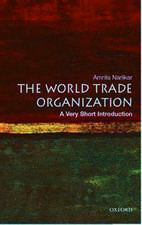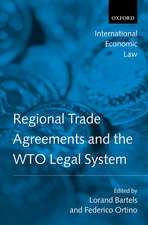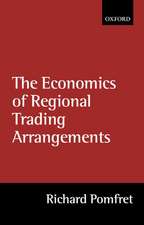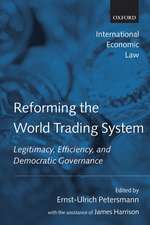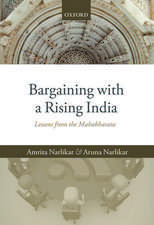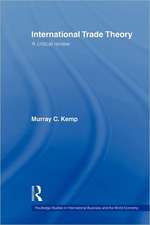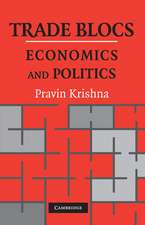International Trade and Developing Countries: Bargaining Coalitions in GATT and WTO: RIPE Series in Global Political Economy
Autor Amrita Narlikaren Limba Engleză Hardback – 4 sep 2003
Successful coalition building has proven to be a difficult and expensive process. Allies are often not obvious and need to be carefully identified. Large numbers do not necessarily entail a proportionate increase in influence. And the weak have the choice of teaming up against or jumping on the bandwagon with the strong. Even after it has been organised, collective action entails costs of many kinds.
This book investigates the relevance and workability of coalitions as instruments of bargaining power for the weak. More specifically, this analyzes the coalition strategies of developing countries at the inter-state level, particularly in the context of international trade.
Given the nature of this enquiry, this new study uses theoretical and empirical methods to complement each other. The theoretical approach draws from a plethora of writings: formal theories of clubs and coalitions, theories of domestic political economy and theories of international relations. The empirical analysis of comparable coalitions becomes necessary to assist in this theorising, so the greater part of the book focuses mainly (though not exclusively) on coalitions involving developing countries on the issue-area of trade in services. Through the case-studies of the Uruguay Round and an analytical overview of more recent coalitions, this text fills an important gap in the literature of international political economy and international relations where most GATT/WTO-based coalitions have eluded record.
This book will be of great interest to all students of international relations, politics and globalization.
| Toate formatele și edițiile | Preț | Express |
|---|---|---|
| Paperback (1) | 412.37 lei 43-57 zile | |
| Taylor & Francis – 24 mar 2005 | 412.37 lei 43-57 zile | |
| Hardback (1) | 1003.43 lei 43-57 zile | |
| Taylor & Francis – 4 sep 2003 | 1003.43 lei 43-57 zile |
Din seria RIPE Series in Global Political Economy
-
 Preț: 310.75 lei
Preț: 310.75 lei -
 Preț: 280.02 lei
Preț: 280.02 lei -
 Preț: 281.27 lei
Preț: 281.27 lei -
 Preț: 310.01 lei
Preț: 310.01 lei -
 Preț: 390.13 lei
Preț: 390.13 lei -
 Preț: 288.81 lei
Preț: 288.81 lei - 26%
 Preț: 820.21 lei
Preț: 820.21 lei - 18%
 Preț: 700.75 lei
Preț: 700.75 lei -
 Preț: 386.55 lei
Preț: 386.55 lei -
 Preț: 470.90 lei
Preț: 470.90 lei - 18%
 Preț: 999.82 lei
Preț: 999.82 lei - 18%
 Preț: 1054.97 lei
Preț: 1054.97 lei - 18%
 Preț: 1057.40 lei
Preț: 1057.40 lei - 18%
 Preț: 1055.60 lei
Preț: 1055.60 lei - 18%
 Preț: 1053.16 lei
Preț: 1053.16 lei -
 Preț: 362.26 lei
Preț: 362.26 lei -
 Preț: 456.16 lei
Preț: 456.16 lei - 18%
 Preț: 1058.79 lei
Preț: 1058.79 lei - 18%
 Preț: 1057.89 lei
Preț: 1057.89 lei - 26%
 Preț: 822.54 lei
Preț: 822.54 lei -
 Preț: 278.75 lei
Preț: 278.75 lei - 18%
 Preț: 1056.47 lei
Preț: 1056.47 lei - 18%
 Preț: 1057.89 lei
Preț: 1057.89 lei - 18%
 Preț: 1054.89 lei
Preț: 1054.89 lei -
 Preț: 453.96 lei
Preț: 453.96 lei -
 Preț: 411.42 lei
Preț: 411.42 lei -
 Preț: 428.67 lei
Preț: 428.67 lei - 26%
 Preț: 821.53 lei
Preț: 821.53 lei -
 Preț: 487.86 lei
Preț: 487.86 lei -
 Preț: 353.94 lei
Preț: 353.94 lei - 26%
 Preț: 846.78 lei
Preț: 846.78 lei - 31%
 Preț: 766.24 lei
Preț: 766.24 lei - 18%
 Preț: 1058.43 lei
Preț: 1058.43 lei - 15%
 Preț: 425.07 lei
Preț: 425.07 lei - 18%
 Preț: 696.82 lei
Preț: 696.82 lei -
 Preț: 395.16 lei
Preț: 395.16 lei - 18%
 Preț: 700.31 lei
Preț: 700.31 lei - 18%
 Preț: 1004.20 lei
Preț: 1004.20 lei -
 Preț: 465.69 lei
Preț: 465.69 lei - 15%
 Preț: 672.40 lei
Preț: 672.40 lei - 18%
 Preț: 1016.52 lei
Preț: 1016.52 lei - 18%
 Preț: 1115.21 lei
Preț: 1115.21 lei -
 Preț: 485.07 lei
Preț: 485.07 lei
Preț: 1003.43 lei
Preț vechi: 1223.70 lei
-18% Nou
Puncte Express: 1505
Preț estimativ în valută:
192.03€ • 199.74$ • 158.53£
192.03€ • 199.74$ • 158.53£
Carte tipărită la comandă
Livrare economică 14-28 aprilie
Preluare comenzi: 021 569.72.76
Specificații
ISBN-13: 9780415318594
ISBN-10: 0415318599
Pagini: 256
Ilustrații: 1
Dimensiuni: 156 x 234 x 21 mm
Greutate: 0.54 kg
Ediția:1
Editura: Taylor & Francis
Colecția Routledge
Seria RIPE Series in Global Political Economy
Locul publicării:Oxford, United Kingdom
ISBN-10: 0415318599
Pagini: 256
Ilustrații: 1
Dimensiuni: 156 x 234 x 21 mm
Greutate: 0.54 kg
Ediția:1
Editura: Taylor & Francis
Colecția Routledge
Seria RIPE Series in Global Political Economy
Locul publicării:Oxford, United Kingdom
Public țintă
Postgraduate and ProfessionalCuprins
Introduction: Bargaining Together: Why and How? Coalitions in the GATT and the Entry of Services 1. Bloc Diplomacy: The Informal Group and the G-10 2. Alliance Diplomacy: The Issue-Based, Crossover Coalitions of G-20 and Café au Lait 3. Combination Diplomacy: Issue-Based Blocs and Sub-Sectoral Crossover Coalitions 4. Evolved Alliances: The Cairns Group and Chapter 5. Friends of Services Group 6. Regionalism: A Springboard for Bargaining? 7. Coalitions of the New Round: Developing Countries 8. At Seattle and Doha 9. Conclusion Bibliography
Notă biografică
Amrita Narlikar is Lecturer at the Centre of International Studies, University of Cambridge; Senior Research Associate at the Centre for International Studies, University of Oxford; member of the Economic Negotiations Network based at the University of Southern California, Los Angeles and the Latin American Trade Network, Buenos Aires.
Recenzii
"This is an important and insightful book of great interest to anyone seeking to understand the dynamics of the past, present and future negotiating rounds, as well as developing country coalition behaviour in other international arenas."
Dr Sean W. Burges, University of Wales, Aberystwyth. International Affairs, October 2004, Vol. 80, Issue 5
"In a nutshell, for everyone interested in understanding how the coalitions of developing countries should be devised and work in negotiations within WTO issues in special Trade in Services, this book is essential reading."
Rogerio de Souza Farias University of Brasilia, Brazil. Political Studies Review, 2004 2 (3), 414-439
"Narlikar's book is a sophisticated and well written analysis that represents a significant contribution to the literature on international trade negotiations."
Professor Wyn Grant, University of Warwick, UK. Review of International Studies, 2004, Vol. 30, 537-544
'An important and insightful book of great interest to anyone seeking to understand the dynamics of the past, present and future negotiating rounds, as well as developing country coalition behaviour in other international arenas.'
Sean W. Burges, International Affairs
'In a nutshell, for everyone interested in understanding how the coalitions of developing countries should be devised and work in negotiations within WTO issues in special Trade in Services, this book is essential reading.'
Rogerio de Souza Farias, Political Studies Review
"Narlikar's book is a sophisticated and well written analysis that represents a significant contribution to the literature on international trade negotiations."
Professor Wyn Grant, Review of International Studies
"Narlikar’s book is an impressively rigorous and informed study of the role and efficacy of bargaining coalitions, especially but not exclusively of developing countries, for trade negotiations in both the GATT (especially the Uruguay Round) and the WTO (up to Doha). The book is written in an accessible style and provides a valuable addition to the collection of anybody interested in multilateral trade negotiations."
Oliver Morrissey, Journal of International Development
Dr Sean W. Burges, University of Wales, Aberystwyth. International Affairs, October 2004, Vol. 80, Issue 5
"In a nutshell, for everyone interested in understanding how the coalitions of developing countries should be devised and work in negotiations within WTO issues in special Trade in Services, this book is essential reading."
Rogerio de Souza Farias University of Brasilia, Brazil. Political Studies Review, 2004 2 (3), 414-439
"Narlikar's book is a sophisticated and well written analysis that represents a significant contribution to the literature on international trade negotiations."
Professor Wyn Grant, University of Warwick, UK. Review of International Studies, 2004, Vol. 30, 537-544
'An important and insightful book of great interest to anyone seeking to understand the dynamics of the past, present and future negotiating rounds, as well as developing country coalition behaviour in other international arenas.'
Sean W. Burges, International Affairs
'In a nutshell, for everyone interested in understanding how the coalitions of developing countries should be devised and work in negotiations within WTO issues in special Trade in Services, this book is essential reading.'
Rogerio de Souza Farias, Political Studies Review
"Narlikar's book is a sophisticated and well written analysis that represents a significant contribution to the literature on international trade negotiations."
Professor Wyn Grant, Review of International Studies
"Narlikar’s book is an impressively rigorous and informed study of the role and efficacy of bargaining coalitions, especially but not exclusively of developing countries, for trade negotiations in both the GATT (especially the Uruguay Round) and the WTO (up to Doha). The book is written in an accessible style and provides a valuable addition to the collection of anybody interested in multilateral trade negotiations."
Oliver Morrissey, Journal of International Development
Descriere
This book analyses the much-needed and vastly under-studied subject of bargaining coalitions of developing countries in the GATT and WTO.
